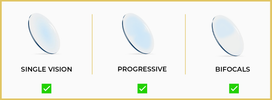


Utilisez notre essai virtuel pour mesurer la DP de votre œil
Qu'est-ce que l'écart pupillaire ?
Votre PD est la distance en millimètres entre le centre d'une pupille et le centre de l'autre pupille. Cette mesure garantit que nous fabriquons vos verres avec la prescription exactement là où vos yeux en ont besoin, ce qui se traduit par une vision supérieure !
Types de mesures pupillaires
Les mesures de PD simples et doubles sont les deux types de mesures de PD.
La distance entre les centres d'une pupille et les centres de l'autre est appelée mesure de DP simple ou binoculaire. Une seule mesure de DP donne une seule valeur, telle que 60, 63 ou 55 mm.
La distance entre le centre de chaque pupille et l'arête du nez est appelée DP double ou monoculaire. Les mesures de DP double consistent en deux nombres. Par exemple, si le double PD est 31/33, le premier nombre fait référence à l'œil droit et le second à l'œil gauche.
Comment mesurer la PD en ligne lors de l'utilisation de Virtual Try-On ?
 |
 |
 |
 |
- Préparez-vous pour l'analyse
Tenez votre téléphone ou votre appareil photo droit et cliquez sur l'essai.
2. Ajustez le diaphragme
Après l'étape 2, des lentilles bleues apparaissent sur l'écran en tant qu'iris. Ajustez la taille de l'iris et appuyez sur Continuer.
3. Cliquez sur les filtres
Cliquez sur les 3 lignes de filtre à côté de l'icône de la caméra en bas.
-
Notez votre PD
Une fois que vous avez reçu votre PD, notez le numéro à partir de 42-71, entrez les instructions pour la commande et envoyez-le nous avec votre ordonnance.
Nous avons besoin de votre distance pupillaire pour s'assurer que notre laboratoire obtiendra votre ordonnance parfaitement dans vos lentilles.
La fonction d'essai virtuel est maintenant disponible sur notre site Web.
By clicking Virtual Try-On you are granting us permission to use your devices camera in order to assist you in selecting the best frames for you.
None of your personal data will be saved, recorded, sent, transferred, used, or sold.
For more information please refer to our Privacy Policy.
Premium Lenses, Expertly Matched.
We carry a curated selection of premium lens brands to give you exceptional clarity and comfort. Not sure which lenses are right for you? Use our chat to get personalized lens recommendations!
FAQs
Can I use my vision insurance?
Yes you can! We provide invoices for all eyewear that you can submit to your insurance company. To learn more visit our vision insurance page. Vision insurance discounts are up to your insurer and coverage.
How do I know which lenses are right for me?
You can use our chat support to help you select the right lenses for your needs! 💬
How much do you charge for shipping?
Orders worth more than CAD $100.00 in Canada, USD $100 in United States & Globally above CAD $250 qualify for Free Shipping.
Our standard shipping cost is based on area, country & postal code and shipping services selected, calculated by carrier.
How long will it take to get my order?
We aim to ship your order the same day. Standard shipping to the Greater Toronto Area takes 2-3 business days, within North America (USA & Canada) takes 5-7 business days, and international orders may take longer. For urgent orders, we recommend Express shipping.
Contact Lenses & Prescription Glasses are Processed from British Columbia.
My question is not listed above.
For more details, please check out our FAQ, or don't hesitate to reach out to us via chat if you have any questions!














